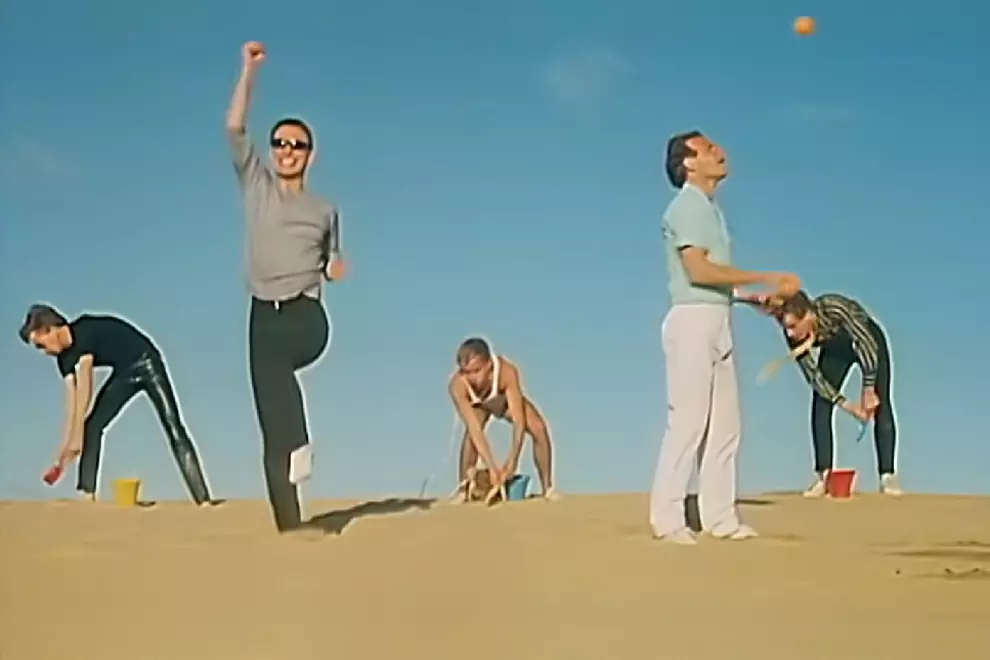 Men At Work
Men At WorkWhen Men At Work’s Down Under knocked off Phil Collins’ You Can’t Hurry Love to claim the top spot on the UK charts on January 29, 1983, they achieved something that no other Australian act has come close to emulating.
Indeed, it’s a feat that only 12 acts have achieved in music history.
Men At Work were just the fifth act to have the number one single and album in the US and UK – in the same week. And they were the first to achieve the feat since Rod Stewart in 1971.
“It was a statistic that was told to us on the tour bus, and I believe I was quite hungover that day,” Men At Work singer Colin Hay remembers. “People were always hitting us with statistics around then. It was great, but the gigs were the thing.”
Yep, this was just another statistic during a year when Melbourne’s Men At Work were the hottest band on the planet.
Their debut, Business As Usual, spent 15 weeks on top of the US charts – then a record for a debut album. It was finally knocked off by Michael Jackson’s Thriller.
Another Australian album wouldn’t top the US charts for 25 years until AC/DC’s Black Ice hit number one.
Men At Work were your classic dags-to-riches story.
Don't miss a beat with our FREE daily newsletter
Michael Gudinski revealed his biggest regret was rejecting the band – not once, but twice. “That was something I had to have therapy about for a while,” the Mushroom boss said.
After finally signing to CBS (now Sony), Men At Work’s debut album cost just $30,000 to make. It ended up selling more than six million copies in the US. The follow-up, Cargo, cost $70,000. The band generated income for CBS of about $40 million – for a recording outlay of $100,000.
Ironically, the band’s local record company representatives, Peter Karpin and Denis Handlin had to fight to secure a US release.
“They [the US label] rejected the album twice because they didn’t think there were any hits on it,” Hay recalls.
Karpin signed Men At Work at the start of 1981. He remembers being at a sales conference in the US, pleading with the label to release Business As Usual, which was already a hit in the rest of the world. He was asked if he had any slides to show the conference. “No,” he said, “but I’ve got this video.” He played the Down Under clip, and CBS committed to an American release.
In February 1983, Men At Work became the first Australian act to win one of the so-called “big” Grammys – Best New Artist. Colin Hay declared, “We are the Men, and we’ll see you again.”
But Men At Work fell victim to the Best New Artist “curse” – think of previous winners such as Starland Vocal Band, Debby Boone, A Taste of Honey and Christopher Cross.
Then again, The Beatles also won the award.
Also in 1983, Men At Work became the first Australian-based band to make the cover of the US edition of Rolling Stone. In the article, Men At Work: Out To Lunch, Kurt Loder pondered their chart-topping success. “There must be some auxiliary explanation for Men at Work’s extraordinary success,” he wrote, “beyond the undeniable appeal of their music, with its carefully crafted melodies, chugging guitars, sunny rhythms, stick-in-your-head horn lines and rich, throaty vocals. Somehow, the whole of their commercial achievement seems greater than the sum of its artistic parts.”
Colin Hay and Greg Ham did a radio interview in Melbourne, where the interviewer asked: “You’ve had a number one album and two number one singles. What next?”
“I don’t know,” Hay replied. “I think we’re going to put out a single called ‘What Can We Say Now?’”
Ham: “Or ‘Who Was That Then?’”
After their second album provided two more Top 10 singles in the US – Overkill and It’s A Mistake – Men At Work parted with their rhythm section, Jerry Speiser and John Rees. “Sacking one member of a group was a distraction,” says the band’s lawyer Phil Dwyer. “Sacking two was self-destruction.”
“It was,” says Hay, “very Spinal Tap.”
Noted American producer Jimmy Iovine (Bruce Springsteen, Patti Smith, Tom Petty, U2) was engaged to produce the band’s third album, Two Hearts, but he was also fired.
The late Greg Ham told me that, in retrospect, that was a mistake. Though they sensed that Iovine wasn’t that interested in being in the studio, Ham believed he would have got the label vibed on the record (legend has it that when Iovine was once asked what his favourite instrument was, he ripped the phone off the studio wall and yelled, “This is my favourite instrument!”).
The legendary Renée Geyer sang on the third album’s second single, Maria, and appeared in the video.
By the time Two Hearts – which cost $450,000 to make – was released, guitarist Ron Strykert had departed. People magazine in the US noted that the group had a “manpower shortage”. And soon after, Greg Ham also exited – Colin Hay was a Man At Work.
It was a wild ride, one that no other Australian band has had.
“I still reel from it sometimes, you know,” Hay says. “It was a very amazing thing to happen in your life. There are blurry aspects to it … it was just insane, really.”
As Hay reflected in his solo single Are You Lookin’ At Me?: “When I flew across the ocean, I was number one/ People gave me everything, and I didn’t need a gun.”
Asked for his take on why the band burned out, Hay says: “A lot of bands spend years building up a live following, they build a foundation. We didn’t have a foundation; we just had all the top – beautiful furnishings and walls and a roof, but it was built on nothing. There was no foundation. When that was taken away, there was nothing there.”
Any regrets?
“The band really ended when the rhythm section got sacked. It was the way it was done. The regret that I have is the communication skills between six men were not better. It was always a quirky, odd group of people, so I think it was always destined to not last that long.
“But we did have something magical for a minute or two.”
And the band’s impact cannot be denied. Men At Work had the world singing about Vegemite sandwiches and fried-out Kombis.
Fun fact: Since Men At Work, only one Australian artist, Sia, has had a number-one single and album in the US. Coincidentally, Sia calls the Men At Work singer “Uncle Colin” – her dad, Phil Colson, is Hay’s old friend and played the guitar on the Men At Work single Everything I Need.
Colin Hay continues to tour the world, often with Ringo Starr’s All-Starr Band. “I’ll go straight from a Gulfstream IV to filling up my own mini-van with gas in St. Louis. It’s quite a shock.”
Hay accepts that his albums now sell in the thousands, not millions. “This is my chosen profession,” he says. “It’s what I do. Ultimately, I believe in effort. Sometimes you make a lot of effort, and nothing happens. But sometimes it does happen. If you don’t make the effort, there’s much less possibility of something happening.
“I’m a better singer, and I’m a better songwriter than I was then, I know I am. The paradox is I’ve had much less commercial success. You write a song like Down Under, with Ron … and that’s not a bad song, but it’s definitely not the best song I’ve written. But that’s the way it goes, people pick up on something, and it’s out of your hands.
“Other people compare my life now to my life then, but I see no point in comparing. I don’t see achievement in terms of heady commercial success, that’s not what my life’s about.”
And despite the unnecessary legal dramas, Hay still enjoys performing the song that was number one in the US and UK 40 years ago this week.
“Down Under is my friend,” he says. “I will no doubt play it for as long as I am able.”
Hay wrote the song with Strykert in the winter of 1978, before Men At Work formed. Hay recalls driving down Power Street in Hawthorn with the line, “Living in the land down under” running through his head. “I thought to myself, ‘That could be something, better finish that.’ And I’m glad I did.”
The band released the first version of Down Under as an independent single in 1980.
Down Under became a hit again in Australia in 1983 when it was the anthem for Australia’s successful America’s Cup challenge. “Down Under lives in my heart, and may perhaps live in yours,” Hay says. “I claim it and will continue to play it for as long as you want to hear it.”
The acts who have had simultaneous chart-toppers in the US & UK with the same song and album
The Beatles – A Hard Day’s Night/A Hard Day’s Night (1964)
The Beatles – We Can Work It Out/Rubber Soul (1966)
The Monkees – I’m A Believer/The Monkees (1967)
Simon & Garfunkel – Bridge Over Troubled Water/Bridge Over Troubled Water (1970)
Rod Stewart – Maggie May/Every Picture Tells A Story (1971)
Men at Work – Down Under/Business As Usual (1983)
Michael Jackson – Billie Jean/Thriller (1983)
Beyoncé – Crazy In Love/Dangerously In Love (2003)
Drake – One Dance/Views (2016)
Ed Sheeran – Shape of You/÷ (2017)
Ariana Grande – 7 Rings/Thank U, Next (2019)
Lady Gaga – Rain On Me (with Ariana Grande)/Chromatica (2020)
Taylor Swift – Anti-Hero/Midnights (2022)
















